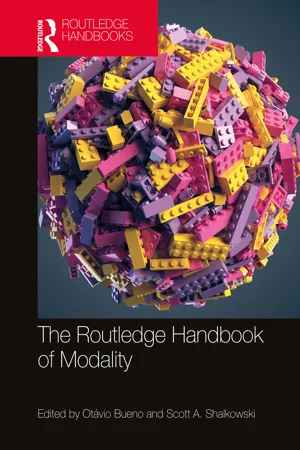
The Routledge Handbook of Modality
Otávio Bueno, Scott A. Shalkowski, Otávio Bueno, Scott A. Shalkowski
- 416 pages
- English
- ePUB (mobile friendly)
- Available on iOS & Android
The Routledge Handbook of Modality
Otávio Bueno, Scott A. Shalkowski, Otávio Bueno, Scott A. Shalkowski
About This Book
Modality - the question of what is possible and what is necessary - is a fundamental area of philosophy and philosophical research. The Routledge Handbook of Modality is an outstanding reference source to the key topics, problems and debates in this exciting subject and is the first collection of its kind. Comprising thirty-five chapters by a team of international contributors the Handbook is divided into seven clear parts:
-
- worlds and modality
- essentialism, ontological dependence, and modality
- modal anti-realism
- epistemology of modality
- modality in science
- modality in logic and mathematics
- modality in the history of philosophy.
Within these sections the central issues, debates and problems are examined, including possible worlds, essentialism, counterfactuals, ontological dependence, modal fictionalism, deflationism, the integration challenge, conceivability, a priori knowledge, laws of nature, natural kinds, and logical necessity.
The Routledge Handbook of Modality is essential reading for students and researchers in epistemology, metaphysics and philosophy of language. It will also be very useful for those in related fields in philosophy such as philosophy of mathematics, logic and philosophy of science.
Frequently asked questions
Information
PART 1
Worlds and modality
Chapter 1
POSSIBLE WORLDS
1.1Introduction
1.2Possible worlds semantics
(□*) □A is true at a world iff A is true at every world.
(◊) ◊A is true at a world iff A is true at some world.
Table of contents
- Cover
- Half Title
- Series Page
- Title Page
- Copyright Page
- Dedication
- Table of Contents
- Notes on Contributors
- Introduction: Modal Matters Philosophical Significance
- PART 1: Worlds and Modality
- PART 2: Essentialism, Ontological Dependence, and Modality
- PART 3: Epistemology of Modality
- PART 4: Epistemology of Modality
- PART 5: Modality and the Metaphysics of Science
- PART 6: Modality in Logic and Mathematics
- PART 7: Modality in the History of Philosophy
- Index